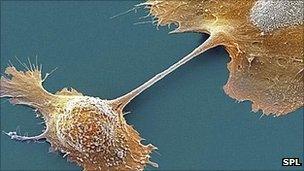Cardiff University's pancreas molecule research go ahead
- Published

Pancreatic cancer is difficult to diagnose in the early stages of the disease
Scientists have been given the go-ahead for a five year research project to study a molecule that may naturally protect the pancreas against cancer.
The Cardiff University team will also investigate cells which may link pancreatitis and cancer.
Pancreatic cancer has the lowest five-year survival rate of all common cancers in the UK.
The team has now been awarded a £2m Medical Research Council grant to continue their research.
Just 3% of people survive five years after diagnosis and most people die within six months of discovering they have the cancer, according to the charity Pancreatic Cancer UK.
Chronic pancreatitis, which can develop when the enzymes needed for digestion turn on the pancreas itself, increases the risk of pancreatic cancer.
Last year Professor Ole Petersen and colleagues at Cardiff University's School of Biosciences discovered a calcium-like molecule which could boost the pancreas' natural protection against these digestive enzymes.
Now the team has secured a £2m grant from the Medical Research Council (MRC) to investigate the potential of the molecule further.
Over the next five years, they will test its ability to protect against enzymes in a number of circumstances known to trigger pancreatitis.
The team will also investigate special cells in the pancreas called stellate cells, which it is believed may provide a link between chronic pancreatitis and the development of pancreatic cancer.
'Painful and distressing'
Prof Petersen said: "These are extremely complex molecular processes but we believe they are crucial to our understanding of these painful and distressing diseases.
"We aim to identify ways of controlling these processes to help prevent and treat acute pancreatitis.
"We also hope to build on our existing knowledge to better understand stellate cells and block the onset of pancreatic cancer."
High alcohol intake and gallstones are the most common causes of pancreatitis, according to the university.
It previously found that a protein called calmodulin could protect the pancreas against the effects of alcohol.
In cells without calmodulin, alcohol speeds up a chain reaction causing cells to self-destruct, leading to pancreatitis and potentially to pancreatic cancer.
This discovery and that of the calcium-like molecule were highlighted in the MRC's review of the most significant developments of 2011.
- Published7 September 2011
- Published14 April 2011